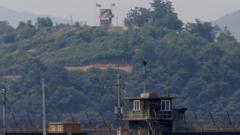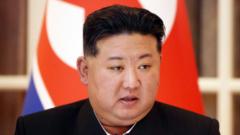In a recent incident, South Korea's military confirmed that it fired warning rounds at North Korean troops crossing the heavily fortified border, a move that has elicited a strong response from Pyongyang, labeling it a "deliberate provocation." This confrontation emerges against a backdrop of increasing hostilities and diplomatic efforts faltering, particularly as South Korean President Lee Jae Myung embarks on a significant diplomatic tour of Japan and the United States. North Korea’s recent actions, including decisive rhetoric from Kim Jong Un's sister against reconciliation, signal a hardening stance amidst ongoing military developments, such as the sealing of the border. The divided Korean Peninsula, technically still at war since the Korean War’s ceasefire in 1953, continues to be a volatile region marked by a complex interplay of military maneuvers and diplomatic strains.
Tensions Mount as South Korea Fires Warning Shots at North Korean Troops

Tensions Mount as South Korea Fires Warning Shots at North Korean Troops
Escalating tensions on the Korean Peninsula witnessed South Korea firing warning shots at North Korean soldiers who briefly crossed the border.
South Korea's Joint Chiefs of Staff reported that the incident occurred when North Korean soldiers crossed the military demarcation line but quickly retreated. North Korean media responded harshly, warning that such provocations could lead to uncontrollable tensions. This flare-up comes as both nations grapple with their historical enmity, with efforts at improved relations under the new South Korean administration facing significant challenges, particularly following North Korea's dismissal of earlier conciliatory gestures. With the DMZ remaining a dangerous zone rife with potential for conflict, the region's stability is once more called into question.
As both nations assess their military readiness and diplomatic postures, the situation necessitates careful observation of this fragile relationship, characterized by intricate dynamics that could lead to further escalation or a renewed commitment to peace talks in the future.
The divide between the Koreas persists, shaped by decades of conflict, rhetoric, and traditional animosities, leaving the fate of regional peace uncertain as leaders navigate a complex web of national interests and historical grievances.
As both nations assess their military readiness and diplomatic postures, the situation necessitates careful observation of this fragile relationship, characterized by intricate dynamics that could lead to further escalation or a renewed commitment to peace talks in the future.
The divide between the Koreas persists, shaped by decades of conflict, rhetoric, and traditional animosities, leaving the fate of regional peace uncertain as leaders navigate a complex web of national interests and historical grievances.


















